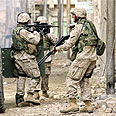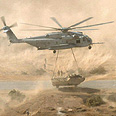

There is a significant risk that the US military, strained by the demands of wars in Iraq and Afghanistan, will not be able to quickly and fully respond to yet another crisis, stated a new defense review submitted to Congress.
The review grades the military's ability to meet the demands of the nation's military strategy - which would
include fighting the wars as well as being able to respond to any potential outbreaks in places such as North Korea, Iran, Lebanon, Cuba or China.
The assessment, conducted by America's top military officer, Gen. Peter Pace, chairman of the Joint Chiefs of Staff, indicates a greater risk than a year ago, when it was rated as moderate.
On Monday senior defense officials confirmed the decline in overall military readiness. And a report that accompanied Pace's review concluded that while the Pentagon is working to improve its warfighting abilities, it "may take several years to reduce risk to acceptable levels."
Pace's report comes as the US is increasing its forces in Iraq to quell escalating violence in Baghdad. Top military officials have consistently acknowledged that the repeated and lengthy deployments are straining the Army, Marine Corps and reserve forces and taking a heavy toll on
critical warfighting equipment.
The readiness level of the US military has seesawed back and forth during the Iraq war. Officials, speaking on condition of anonymity, said the risk for 2005 was moderate, but it was assessed as
significant in 2004.
Additionally, Pace's assessment does not reflect the latest move to pour 21,500 more troops into Iraq over the next few months.
The assessment was submitted to Defense Secretary Robert Gates, who delivered it to Congress, along with a six-page report on steps the Pentagon is taking to address the problem - including new efforts to increase the size of the Army and Marine Corps, and requests for more money to repair and replace equipment.
That report concluded that "world events and regional trends add up to increased challenges to our nation's security." It also said the decline in readiness is affected by whether other federal agencies and other nations are fulfilling their commitments.
There have been long-standing complaints that the State Department has not met its responsibilities in Iraq, particularly in reconstruction and rebuilding efforts, as well as buttressing the political development of the Iraqi government.















